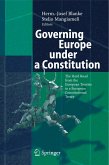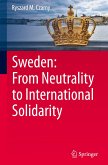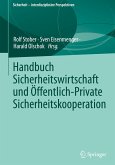In July 2003, the President of the Constitutional Convention, the former French President Giscard d'Estaing, presented to the Heads of State and Government the draft of a "Constitution for Europe". This volume documents the unusual process of constitution-giving in a meticulous analysis: from the establishment of the Convention via the Intergovernmental Conference to the current attempts at ratifying the Treaty. This includes a close look at the negative outcome of the referenda in France and the Netherlands, and leads to an attempt at coping with the current crisis by reviewing the logic of the integration process and the ways and means to move ahead.
As a result of an all-encompassing monitoring, the approach, the process and the results of the Convention's work as well as of the following attempts at consensus-building are scrutinized in great detail. The book provides, therefore, one of the most profound analyses of this crucial step in European integration
Nach anderthalbjähriger Beratung stellte der Präsident des "EU-Verfassungskonvents", der frühere französische Staatspräsident Giscard d'Estaing, im Juli 2003 den Staats- und Regierungschefs der Mitgliedstaaten den Entwurf einer "Verfassung für Europa" vor. Der Band dokumentiert diesen in der Geschichte Europas ungewöhnlichen Prozess der Verfassunggebung - von den Überlegungen zur Einsetzung des Konvents über den Abschluss der Regierungskonferenz bis hin zu den derzeit laufenden Ratifizierungsverfahren. Die nach den ablehnenden Voten in Frankreich und den Niederlanden erkennbare Krise wird dabei ebenso einbezogen wie der Versuch, ihr durch ein verändertes Integrationsverständnis zu begegnen.
Als Resultat einer umfassenden Begleitforschung im Rahmen des Internationalen Instituts für Staats- und Europawissenschaften (ISE) in Berlin werden der Ansatz, das Verfahren und die Ergebnisse der Konventsarbeit sowie die Prozesse der nachfolgenden Konsensbildung einer detaillierten Untersuchung unterzogen. Sie stellt nicht nur eine der aktuellsten, sondern auch materiell fundiertesten Auseinandersetzungen mit diesem für die Zukunft Europas vielleicht entscheidenden Entwicklungsschritt dar.
As a result of an all-encompassing monitoring, the approach, the process and the results of the Convention's work as well as of the following attempts at consensus-building are scrutinized in great detail. The book provides, therefore, one of the most profound analyses of this crucial step in European integration
Nach anderthalbjähriger Beratung stellte der Präsident des "EU-Verfassungskonvents", der frühere französische Staatspräsident Giscard d'Estaing, im Juli 2003 den Staats- und Regierungschefs der Mitgliedstaaten den Entwurf einer "Verfassung für Europa" vor. Der Band dokumentiert diesen in der Geschichte Europas ungewöhnlichen Prozess der Verfassunggebung - von den Überlegungen zur Einsetzung des Konvents über den Abschluss der Regierungskonferenz bis hin zu den derzeit laufenden Ratifizierungsverfahren. Die nach den ablehnenden Voten in Frankreich und den Niederlanden erkennbare Krise wird dabei ebenso einbezogen wie der Versuch, ihr durch ein verändertes Integrationsverständnis zu begegnen.
Als Resultat einer umfassenden Begleitforschung im Rahmen des Internationalen Instituts für Staats- und Europawissenschaften (ISE) in Berlin werden der Ansatz, das Verfahren und die Ergebnisse der Konventsarbeit sowie die Prozesse der nachfolgenden Konsensbildung einer detaillierten Untersuchung unterzogen. Sie stellt nicht nur eine der aktuellsten, sondern auch materiell fundiertesten Auseinandersetzungen mit diesem für die Zukunft Europas vielleicht entscheidenden Entwicklungsschritt dar.








